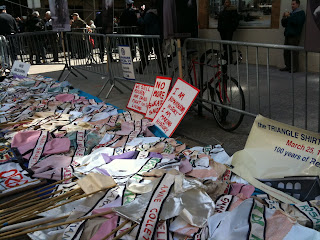On March 25, 1911, fire broke out on the 8th floor of the building on the corner of Washington Place and Greene Street, just off Washington Square Park. Within half an hour, the fire was out, but 146 mostly young women were dead. Many had plunged to their deaths from the windows of the 9th floor, choosing this quick end rather than burning.
The Triangle Shirtwaist Factory was a sweatshop. Women worked with their elbows practically touching, as long as 16 hours a day, 6 days a week, for about $5 a week, making the shirtwaists that were such a liberating garment for so many women. The Triangle's owners were fiercely anti-union. They were also not interested in basic safety measures, such as sprinklers or fire drills. Several of the exit doors were kept locked to "prevent theft." (the women reported having to endure their bags being checked on leaving every evening, to be sure they weren't absconding with fabric scraps) The fire escape not only wasn't strong enough to handle a mass exodus, it didn't even reach the sidewalk.
You can read all about the fire and the impact it had on American workers, factories, legislation, and the psyche in David von Drehle's book, Triangle, the Fire That Changed America. It's a story that needs telling again and again, because we're in serious danger of spinning back to the mentality and practices that started the fire.
I work at the Writers Room on Astor Place, a few blocks from where the Triangle was housed. On Friday, March 25, I attended the ceremony marking the centennial, making comments on Twitter and taking pictures with my iPhone.
The march began down Broadway, with a steady drumbeat and many members of labor unions and the Remember the Triangle Fire Coalition. As they have done every year since the fire, people carried shirtwaists with a ribbon bearing each worker's name. This year, for the first time, all 146 were named, thanks to the assiduous efforts of historian Michael Hirsch, who uncovered the identities of the six unknown victims.
We gathered outside the building, now part of New York University. You can see the banners hanging from the windows where the women jumped:
Here is a picture of the shirtwaists, with the banners in the background:
Many members of unions carried signs with the name and age of a Triangle victim:
Despite being a cold day, the crowd was huge and enthusiastic. This picture does not do it justice:
There were a number of speakers, many either leaders or members of unions. I didn't keep track of names, but here are some of the quotes that stood out for me:
"Let us continue to honor the dead and fight like hell for the living."
"The most important tribute to the victim is not words but DEEDS."
"May we never lose our sense of outrage at the injustices around us."
"This is a fundamental choice between what is wrong and what is right." - that was from a Wisconsin teacher and union leader. I was pleased that there was much talk of Wisconsin, and that the Jumbotron ran photos of the union protests there. The teacher told us how Wisconsin, traditionally so progressive, was the first state to pass worker compensation laws - in 1911, the year of the fire.
After the speeches, a bagpiper played "Amazing Grace" and the ladder from a fire truck on Greene Street was slowly raised to the 7th floor, showing us the other aspect of the day's tragedy - that though the NYFD arrived quickly, their ladders were too short to save the workers trapped on the 9th floor (the executives on the 10th floor escaped via the roof):
Each name was then read. A bell rang after each name and a flower was laid. I wept.
All the shirtwaists were laid across the street:
This was the firefighter who rang the bell, with the individual flowers before the podium. The orange bouquet is for Bangladeshi workers killed in a similar fire:
In one of the few visual examples that could be given of what Triangle helped to change for the better, the NYFD showed us how today, many of the workers could be saved:
Honor the dead. Fight like hell for the living.
Subscribe to:
Post Comments (Atom)











No comments:
Post a Comment